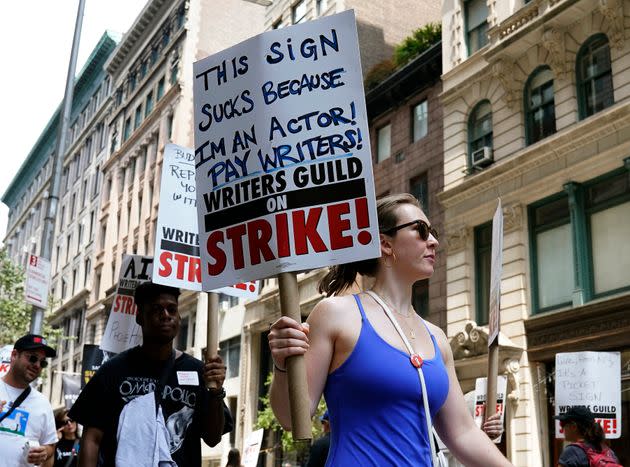Disney CEO Earning About $27 Million A Year Calls Strike By Writers And Actors ‘Disturbing’
- Oops!Something went wrong.Please try again later.

Bob Iger, CEO of Disney, walks to lunch at the Allen & Company Sun Valley Conference on July 12, 2023 in Sun Valley, Idaho. Every July, some of the world's most wealthy and powerful figures from the media, finance, technology and political spheres converge at the Sun Valley Resort for the exclusive weeklong conference.
Disney CEO Bob Iger said striking writers and actors, who are fighting for equitable wages and working conditions while entertainment CEOs have profited immensely from the rise of streaming, complained Thursday the imminent simultaneous strikes would be “very disruptive” and “very disturbing.”
“It’s very disturbing to me. We’ve talked about disruptive forces on this business and all the challenges we’re facing, the recovery from COVID, which is ongoing, it’s not completely back. This is the worst time in the world to add to that disruption,” Iger said in a Thursday interview on CNBC.
He claimed writers and actors are making “not realistic” demands. “There’s a level of expectation that they have that is just not realistic,” he said. “And they are adding to the set of the challenges that this business is already facing that is, quite frankly, very disruptive.”
Iger, whose compensation package has him making up to $27 million a year, made the comments from the Sun Valley Conference in Idaho, an annual gathering of millionaire and billionaire CEOs.
"There is a level of expectations that [the writers and actors] have that is just not realistic," says $DIS CEO @RobertIger on the @sagaftra and WGA strike. "They are adding to a set of challenges that this business is already facing and that is very disruptive." pic.twitter.com/ySYvfQBYA5
— Squawk Box (@SquawkCNBC) July 13, 2023
Since May 2, the 11,500 film and TV writers in the Writers Guild of America East and West have been on strike. On Thursday, more than 100,000 actors represented by the Screen Actors Guild are expected to go on strike as well, marking the first time in six decades that both unions are simultaneously striking.
At the heart of both strikes is the immense wealth gap between executives and workers. While entertainment CEOs like Iger have profited enormously from the boom in streaming services, the writers and actors behind the shows and movies that power those streaming services largely have not. Many struggle to make a living, and see the strikes as essential to preserving the future of writing and acting as a stable career.
The two strikes will effectively shut down the entire entertainment industry, where most productions have already been halted due to the writers strike and production crew members’ solidarity in not crossing picket lines.

Members of the Writers Guild of America and the Screen Actors Guild walk a picket line outside of Warner Bros. in New York on July 13, 2023. Actors were poised to go on strike July 13, joining writers in the first industry-wide shutdown in 63 years after last-ditch talks failed, with nearly all film and television production likely to grind to a halt. SAG-AFTRA, which represents 160,000 performers including A-list stars, said negotiations late July 12 had ended without a deal.
Iger complained the strikes, which could end if studio executives agreed to a fair deal, “will have a very, very damaging affect on the whole business.”
“It will affect the economy of different regions, even because of the sheer size of the business,” he said. “It’s a shame, it is really a shame.”
Historically, writers and actors on TV are paid what is known as residuals every time an episode they wrote or appeared in airs. One key issue in both strikes is how residuals have dwindled in the streaming era. Streaming services often tout supposedly huge viewership numbers while providing limited transparency or metrics. Many writers and actors have said they are barely compensated when told their streaming shows have performed well with viewers.
In response to Iger’s comments Thursday, writers and actors on Twitter have been sharing their residual payments — sometimes as low as a few cents per episode — noting they are “disturbing to me.”
POST YOUR PAY!! Hey Bob, this is disturbing to me!
Let’s start a new trend.. #postyourpay#SAGAFTRA#wgastrike#amptp#SAGAFTRAstrongpic.twitter.com/HWdFb6BvHH— Kellee Stewart (@Kellee_Stewart) July 13, 2023
POST YOUR PAY!! Hey Bob, this is disturbing to me!
Let’s start a new trend.. #postyourpay#SAGAFTRA#wgastrike#amptp#SAGAFTRAstrongpic.twitter.com/TMlHH45D1t— Spencer Rothbell (@srothbell) July 13, 2023
#postyourpay#SAGAFTRA#wgastrong#AMPTP#wgastrike#SAGAFTRAstronghttps://t.co/aquMNdBPxK
— Kellee Stewart (@Kellee_Stewart) July 13, 2023
Related...
Screen Actors Guild Members Poised To Go On Strike After Negotiations Fail
The Writers Strike Has Huge Stakes. Here’s What It Means For TV And Film — And Beyond.
Striking Writers Will Picket Hollywood Bigwig's Graduation Speech
Hollywood Companies Boast About Streaming Profits While Writers Strike For Fair Pay
